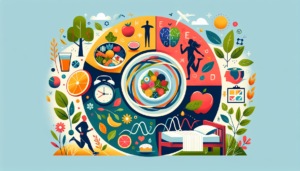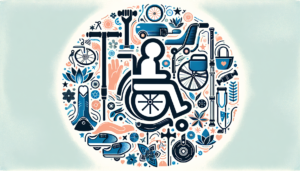Understanding the Connection Between Nutrition and Stress
Understanding the Connection Between Nutrition and Stress
The Physiological Impact of Stress
Stress can trigger a cascade of physiological responses that affect overall health. When we experience stress, our body enters a state of heightened alertness, releasing hormones like adrenaline and cortisol. While this "fight or flight" response is beneficial in the short term, chronic stress can lead to various health issues, including anxiety, heart disease, obesity, and weakened immune function.
Nutritional Needs Under Stress
During stress, our nutritional demands increase. Stress can lead to deficiencies in essential nutrients due to altered eating behaviors or increased metabolic rates. Common nutrients affected include:
Vitamin C
Vitamin C is crucial for synthesizing neurotransmitters and maintaining overall immune function. It also plays a role in reducing cortisol levels. Sources of vitamin C include citrus fruits, strawberries, bell peppers, and broccoli.
B Vitamins
B vitamins such as B6, B12, folate, and riboflavin are essential for energy metabolism, brain function, and stress response. They help manage stress levels by supporting the nervous system and assisting in neurotransmitter production. Foods rich in B vitamins include whole grains, eggs, lean meats, and green leafy vegetables.
Magnesium
Magnesium deficiency is linked to increased stress and anxiety. This mineral helps regulate cortisol levels and promotes relaxation. Foods high in magnesium include nuts, seeds, dark chocolate, and green leafy vegetables.
Omega-3 Fatty Acids
Omega-3 fatty acids play a key role in brain health and mood regulation. They have anti-inflammatory properties that may mitigate the negative impacts of stress. Sources include fatty fish (salmon, tuna), flaxseeds, chia seeds, and walnuts.
The Role of Diet in Stress Management
Adopting a balanced and nutritious diet is pivotal in managing stress effectively. Specific dietary patterns can influence our body’s ability to cope with stress.
The Mediterranean Diet
Rich in fruits, vegetables, whole grains, nuts, fish, and healthy fats, the Mediterranean diet is associated with lower levels of stress and anxiety. This diet is high in omega-3 fatty acids, antioxidants, and fiber, contributing to emotional well-being and cognitive function.
The Importance of Hydration
Staying hydrated is crucial for cognitive clarity and emotional balance. Dehydration can intensify feelings of stress and anxiety and affect mood. Aim for adequate fluid intake by drinking water, herbal teas, or hydrating fruits and vegetables like cucumbers and watermelon.
Foods to Include for Stress Relief
Certain foods can provide a calming effect and help regulate stress levels. Incorporating these into your daily diet may enhance your body’s resilience to stress.
Whole Grains
Whole grains like brown rice, quinoa, and whole wheat bread can stabilize blood sugar levels and enhance mood due to their fiber content. These foods can help prevent spikes and crashes in energy that contribute to stress.
Leafy Greens
Spinach, kale, and other leafy greens are rich in magnesium and folate, promoting brain health. They can aid in regulating stress hormones and improve overall mood.
Fermented Foods
Gut health plays a substantial role in our emotional well-being. Foods like yogurt, kimchi, sauerkraut, and kefir can promote a healthy gut microbiome, linked to reduced stress and anxiety levels.
Dark Chocolate
Moderate consumption of dark chocolate may enhance mood by stimulating the production of endorphins and serotonin. Plus, it contains antioxidants that may help combat oxidative stress in the body.
Foods to Avoid During Stress
Certain foods and substances can exacerbate stress and anxiety, making it important to limit or avoid them during times of heightened stress.
Caffeine
While caffeine can provide a temporary boost in energy, excessive consumption can lead to increased anxiety and disrupt sleep. Limiting coffee, energy drinks, and even tea can help keep stress levels in check.
Sugar
High-sugar foods can lead to blood sugar spikes followed by crashes, which can worsen feelings of stress and anxiety. Processed snacks and sugary beverages should be limited in stressful times.
Alcohol
While alcohol is often viewed as a means to relax, it can lead to increased anxiety and disrupt sleep patterns. Moderation is key, and seeking alternative relaxation strategies may be beneficial.
Mindful Eating and Stress Management
Practicing mindful eating can transform how we relate to food and stress. This approach encourages being fully present during meals, promoting better digestion, and enhancing enjoyment of food.
Techniques for Mindful Eating:
-
Eat Slowly: Take your time to chew and savor each bite. This can enhance satisfaction and prevent overeating.
-
Limit Distractions: Turn off screens and focus on the meal to cultivate appreciation for flavors and textures.
-
Listen to Your Body: Pay attention to hunger and fullness cues, which can help maintain a healthy weight and reduce stress related to body image.
- Gratitude: Begin meals with gratitude to foster a positive mindset.
The Psychological Aspect of Nutrition and Stress
The relationship between nutrition and mental health is a growing area of research. Nutrition not only influences physical health but also shapes mood and cognitive function, which can impact stress levels.
The Gut-Brain Axis
The gut and brain are interconnected through the gut-brain axis, influencing emotions and stress responses. A healthy diet can promote a balanced gut microbiome, leading to improved mental clarity and emotional resilience.
Supplements to Consider
While it is best to obtain nutrients through a well-rounded diet, certain supplements may provide additional support in managing stress and improving mood. However, it’s essential to consult a healthcare professional before beginning any supplementation.
Adaptogens
Adaptogenic herbs like ashwagandha, rhodiola rosea, and holy basil are believed to enhance the body’s stress response and promote relaxation. They can be consumed in various forms, including teas and capsules.
Omega-3 Supplements
If dietary intake of omega-3 fatty acids is low, supplementation with fish oil may benefit those experiencing chronic stress or anxiety.
Lifestyle Changes to Complement Nutrition
A holistic approach to stress management goes beyond nutrition. Incorporating lifestyle changes can further enhance your resilience to stress.
Regular Exercise
Physical activity is an effective way to reduce stress levels by promoting the release of endorphins. Aim for at least 150 minutes of moderate exercise per week, including activities you enjoy, like walking, biking, or dancing.
Sleep Hygiene
Ensuring adequate sleep is crucial for stress management. Practice good sleep hygiene by establishing a sleep schedule, creating a restful environment, and limiting screen time before bed.
Relaxation Techniques
Incorporating relaxation techniques such as yoga, meditation, or deep breathing exercises can help manage stress and calm the mind. These practices can complement a healthy diet, making it easier to cope with daily stressors.
Social Support
Cultivating strong social relationships can buffer against stress. Engage with friends, family, and community groups to foster a sense of belonging and connection.
The Bottom Line
Understanding the connection between nutrition and stress is vital for managing stress effectively. By recognizing the impact of dietary choices on our body’s stress response, we can make more informed decisions that enhance overall well-being. Incorporating nutrient-rich foods, practicing mindfulness, and adopting healthy lifestyle habits can create a robust framework for coping with stress and improving mental health. Focusing on nutrition is not just about physical health; it plays a crucial role in maintaining emotional balance and resilience in today’s fast-paced world.







